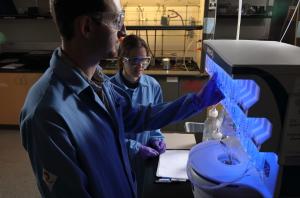Rachel A. Letteri

About
Rachel A. Letteri is an Associate Professor in the Department of Chemical Engineering. After obtaining a B.S. in Chemical & Biomolecular Engineering from the University of Notre Dame, she completed a Ph.D. in Polymer Science & Engineering from the University of Massachusetts Amherst under the direction of Professors TODD EMRICK and RYAN HAYWARD. She then conducted postdoctoral research in the laboratory of Professor KAREN WOOLEY in the Department of Chemistry at Texas A&M University from 2016-2018. Her research interests include materials involving functional polymers, peptides, and interfacial assemblies with applications in medicine and engineering, among others. Rachel also enjoys sharing science and engineering with others through education and outreach.
Lab overview
The LETTERI LAB is engineering materials that synergistically combine polymers and peptides to enable productive interactions with living systems and address central challenges in medicine and engineering. Our specific interests include understanding and exploiting stereochemistry-driven interactions and stimuli-responsive motifs to control materials properties, and using polymers to present and encapsulate peptides in ways that maximize their function.
Education
B.S. Chemical & Biomolecular Engineering, University of Notre Dame, 2010
M.S. Polymer Science & Engineering, University of Massachusetts Amherst, 2012
Ph.D. Polymer Science & Engineering, University of Massachusetts Amherst, 2016
Post-Doc Chemistry, Texas A&M University, 2016-2018


